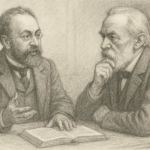Diary Entry – April 6, 2025
Today I woke up far too early due to an air raid on Kyiv. Because of this, I decided to engage in a conversation with ChatGPT about a quote from Goethe’s Faust (“Of the right that is born with us, alas! There’s never any question.”). At first, it misquoted the passage entirely, so I had to look it up myself to see the correct wording. The context was that I have an anthology with essays from legal philosophers discussing the concept of natural law. To understand this, one must know that modern legal philosophy (shaped by Hans Kelsen and David Hume’s is-ought problem) takes a critical stance toward natural law. However, I observe in legal positivism (which holds that only enacted law applies), emerging at the end of the 19th century and shaped by Auguste Comte’s positivism, what followed in the 20th century. This led to Radbruch’s formula, which under certain circumstances allows a judge to ignore positive (enacted) law.
Since a good friend of mine recently became a mother, the topic naturally arose of whether a child, by being born, brings a right into the world. My thoughts concluded that because the child was wanted, it inherently carries the right to exist. The mother protects this unconditional right with her care. This led to an inversion of the usual prerequisites for being (like “I think, therefore I am” or “I work, therefore I am”): “I am because I was wanted.” From this will, the right to exist is derived (“I am, therefore I may be” – also reflected in Goethe’s line: “Here I am human, here I may be”). This idea encompasses the concept of a person’s inviolable dignity (a constitutional principle in many states and the basis of human rights after World War II).
The conversation shifted to Kelsen’s view of justice, which he critically dissected in a small book, claiming there’s no measure for absolute justice. His conclusion was that democracies are still the ideal systems for achieving justice. This transitioned to Bertrand Russell and his (famous?) example of the teapot, which demonstrates that the unfalsifiability of a claim is no evidence for its truth. The burden of proof lies with the one making the claim, not the skeptic.
After a brief detour into number theory and how in mathematics Pi can be approximated through iterative processes but never absolutely determined, I applied this idea to the questions of truth and justice.
Eventually, the discussion reached Karl Steinbuch, a cybernetician of the 20th century, and his famous book “Falsch programmiert” (“Wrongly Programmed”). The book depicts a view of humans as information-processing, learning, and feedback-based (thus iterative) systems.
The final summary was that democracies are also “learning and iterative systems,” aimed at creating a framework for the “species-appropriate treatment of humans.”
Lastly, I generated some pencil sketch-style images of what we discussed. The result can be seen as a kind of “picture book” of a thought process. Perhaps some will recognize the illustrated person. 😊








